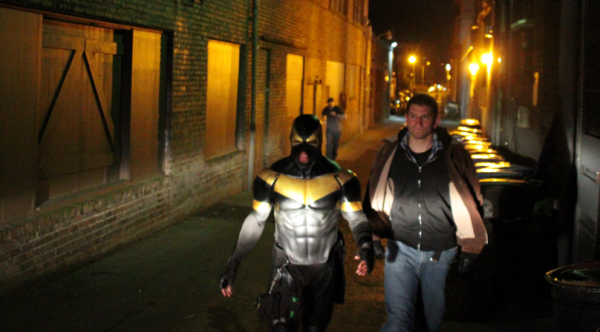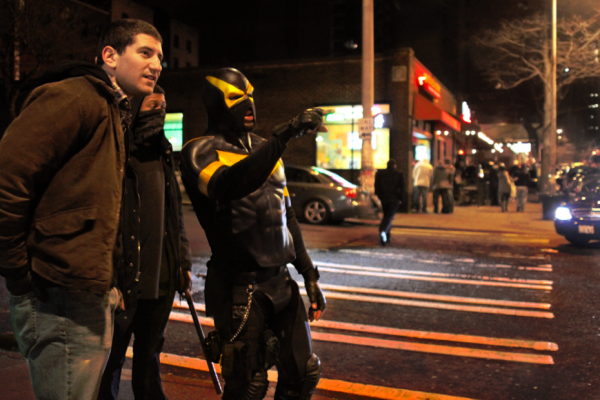
Photo by Theodore James
Originally posted:
http://current.com/entertainment/movies/blog/92969198_real-life-superheroes-get-their-own-film.htm
Superheroes aren’t just for fiction anymore — no longer restrained to the pages of comic books, the large and growing community of Real Life Super Heroes (RLSH) are on the streets as agents of change — with mixed results. No magical-power infused mega-beings, they do what they can to make a difference in home-made costumes, sometimes armed with pseudo-weapons — as an antidote to the pumped-up versions usually presented in films. And now they’ve been lovingly captured in a film of their own, the documentary
Superheroes, which premiered at Slamdance. Producer Theodore James and director Michael Barnett gave us the low-down on the process, the provenance, and what comes next.
Q: Many of these real-life superheroes could be discounted as dorks or weirdos, but by the end of the film you manage to tease out their eloquence. What were the main traits of these people that you wanted to portray in the film? Is there something that you think they all have in common?
MB: There is definitely one thing the whole community has in common, and that’s altruism. I wanted to the audience to leave the film knowing that every single real life superhero does something heroic in his or her own way, to make their communities a better place, regardless of resources.
Q: Do you think they’re escapists?
MB: There is definitely a level of escapism for some RLSH but by and large, after donning the costume and experiencing what it’s like to actually help somebody, most superheroes become deeply entrenched in the notion that they can make a difference, be it big or small, and that seems to be the driving force for most of them. That, and it’s “hella fun,” according to a super hero we know from Clearwater.
Q: Was there any point where you wondered about any of your subjects’ sanity?
MB: Absolutely not! Not even with
Master Legend. I think these guys — I’m speaking of the ones in the film, because of course its hard to speak for the whole community — are eccentric dudes and ladies. They put on a costume, and they realize something: That they can step outside of themselves and their lives, and maybe even become iconic in their communities. It really does something for them. Also, they all have day jobs. For example,
Zetaman works at a packaging plant,
Mr. Extreme is a security guard,
Master Legend is an air conditioning repairman, some of them are tattoo artists… But a lot of them are trying to find a way to do it full time.
It’s funny how our culture treats people who calls themselves superheroes– they’re either ridiculed or adored in their community, but never treated with apathy. There are so many news stories are out there on them, and some of them make fun of them, and some celebrate them… But even when just putting a costume on and walking down the street – people will always react to them.
Q: Do they develop relationships in their communities?
MB: It depends, of course.
Life helps people around his neighborhood in Harlem — homeless people, for instance. His community knows him well, and he knows his community. But then
Mr. Extreme works differently — he listens to the police scanners and then he goes out and patrols the area where he hears there is a lot of criminal activity. The result is that the communities he helps don’t necessarily know him. But he’s still out there on the streets, at least four days a week. We wanted to deconstruct the “superhero” myth, in our society, and then rebuild a sense of what it means to be a
real life superhero: Some want to fight crime, and others want to give food out.
TJ: A few of the subjects in the film confront drug dealers and try to bait criminals into committing crimes. During those nights of filming we were all a bit nervous. Thankfully nothing happened to the subjects or the crew.
Q: Many of your subjects never divulge their true identity to you… Did you find this was something that made it hard to build trust between you and your subjects?
MB: The opposite! Making this film has helped me understand that it is not necessary to know somebody’s real name in order to truly know them as a person. If anything, our lack of needing to know their true names helped them open up to us.

Photo by Theodore James
I think when we approached them and they didn’t tell us their names and bios, we were like “That’s cool, we don’t need them. it’s not part of our story.” Which is different from how reporters react — they need a name to print a story. But what’s a name, really? If someone wants to identify themselves as
Mr. Extreme, then that’s who he is, to us. But, for instance in
Mr Extreme‘s case, I nonetheless got to know him deeper than the costume. He’s a guy that I’ve gone to a couple times a month over the course of the last however many years, have spent hours on end with talking about his life, his family, and getting to know him. I don’t need a name to truly know him.
Q: How did you come across this subject, in the first place? And what made you decide to make a film about it?
MB: I stumbled upon this vast community online. Go ahead, google Real Life Superheroes. I dare ya!I’ve been a cinematographer for 15 years, and have shot a lot of films. I started directing a few years ago, and was making a film for a TV network that, that Theodore [James, the producer] was producing. He was looking for a project, and I mentioned that I’d been gathering some research on this thing. I turned the research in, to him, and he was amazed. He started doing more research, we got in touch with
Mr. Extreme and we went to shoot him. He was the first one to agree to work with us. When we got home and we looked at the footage of him we just
knew. We realized that this guy is fascinating, and we could just do a film about him alone! But it expanded: We got in touch with Stan Lee, and when he agreed, the community just fell into place.
Q: Were there any scenes that didn’t make the final cut that you miss terribly?
MB: We had to cut a lot of
Zetaman, who is an exceedingly noble and humble guy. The work he does with the homeless is heartbreaking and inspiring. He is a true hero in every sense of the word and I’m bummed that we had to lose segments of his story line in the film. I’m also bummed that we had to lose
Master Legend‘s “House of Death” scene. Keep an eye out for the DVD, it will definitely be on there!








